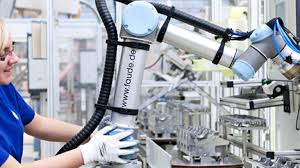Source: industryweek.com
While automation has been steadily increasing its presence across manufacturing companies, the pace has accelerated due to COVID-19.
By 2022 almost 4 million industrial robots are expected to work in factories worldwide, according to the International Federation of Robotics (IFR).
As the robots are being used to speed up the post-Corona economy it is driving demand for skilled workers and educational systems must step up says IFR. “Governments and companies around the globe now need to focus on providing the right skills necessary to work with robots and intelligent automation systems,” Milton Guerry, president of the International Federation of Robotics said in a statement.
Looking at what countries around the world are doing, the results are mixed. “Very few countries are taking the bull by the horns when it comes to adapting education systems for the age of automation,” said Saadia Zahidi, in her role as Head of Education, Gender and Employment Initiatives at the World Economic Forum.“Those that are, have long had a clear focus on human capital development,” Zahidi added.
According to the “automation readiness index” published by The Economist Intelligence Unit (EIU), only four countries have already established mature education policies to deal with the challenges of an automated economy. South Korea is the category leader, followed by Estonia, Singapore and Germany. Countries like Japan, the U.S., and France are developed and China was ranked as emerging.
The EIU summed up the order of the day for governments: more study, multi-stakeholder dialogue, and international knowledge sharing. On a company level, changing hiring is an option as a short-term strategy: “If you can´t find the experienced people, you have to break down your hiring practices to skill sets and not titles,” advised Dr. Byron Clayton, as CEO of Advanced Robotics for Manufacturing at the IFR Round Table in Chicago. “You have to hire more for potential. If you can´t find the person who is experienced then you have to find a person that has the potential to learn that job.”
Re-training the existing workforce is “only a short-term measure,” said Dr. Susanne Bieller, IFR´s General Secretary in a statement. “We must already start way earlier – curricula for schools and undergraduate education need to match the demand of the industry for the workforce of the future. Demand for technical and digital skills is increasing, but equally important are cognitive skills like problem-solving and critical thinking.
“Economies must embrace automation and build the skills required to profit – otherwise they will be at a competitive disadvantage.”


